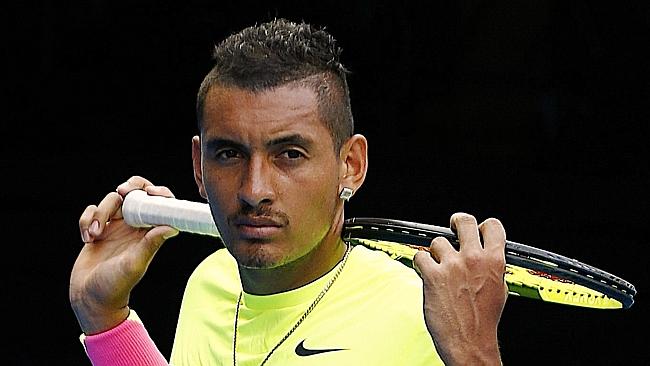There are many sledging Nick Kyrgios today, to the point where you’d swear he had a monstrously large family – fathers, mothers, brothers and sisters – all personally embarrassed by the young man’s behaviour. He’s letting the family down, they say, and he ought to pull up his socks. I won’t quote any of them, because they’re mostly tweets, and when a journalist quotes from the twitterverse you are looking at the words of a docile failure.
Nick Kyrgios doesn’t play tennis for you and me. He plays tennis, and we’re invited to watch. It’s our privilege, not our right. He’s on a mission of his own, just as you are on yours, whether it’s human resources or stamping the face into Golliwog biscuits (or whatever they’re called these days). If Nick Kyrgios, or anyone else, demanded to come and watch you work for a day, you’d probably feel a little put out, claustrophobic and invaded. If he criticised your work, you’d probably want to kick him in the beanbag.
But Australians suffer a peculiar delusion when it comes to their sports stars. They think they’re wedded to them, that the sports star represents them, and that their behaviour is a pristine reflection of the health of the nation, like a wife getting drunk at the Christmas party and spewing all over the guests is a reflection on the state of the marriage.
All this tosh about “doing us proud” and “letting Australia down” is crap. Professional sport is a very personal trajectory. Anyone who reaches that level of competition has had to sacrifice their life, to an extent, in the name of disciplining mind and muscle. Those who think Nick Kyrgios – or any other sports professional – is doing it for the country would find out pretty smartly the folly of that thinking if a national referendum demanded he retire. His response would be more entertaining than any tantrum we’ve seen yet, guaranteed.
I’m old enough to remember John McEnroe and the furore over his antics back in the day. They said the same about him – that he should be corralled into line, be banned from the game. His tantrums were legendary, and were bringing the game into disrepute, so they said. A few decades later and where are his opponents? Jimmy Conners? Bjorn Borg? Ask any kid what Vitas Gerulaitis is and they’d probably guess it’s an STD. It’s McEnroe who’s the elder statesman of tennis, because, far from bringing the game into disrepute, he revealed the tennis court as a popular theatre, where a desperate man might go mad on the edge. He probably did more for tennis than any other player in the game’s history.
What’s strange to me is that so many people don’t seem to get that this is what the beauty of sport is all about. It’s not just about point for point, win or loss, the score on the board – that stuff’s for accountants. Hidden in the data, but there for all to see, is the intensely human drama of men and women overcoming a crisis, wrestling with the shame of failure, the misery of losing, the torment of defeat on live TV. When that moment comes to visit an athlete, sport becomes something higher than numbers.
In 1999 I interviewed George Foreman (doorstopped him at Melbourne airport), the boxer humiliated by Muhammad Ali at the “Rumble in the Jungle” in Kinshasa, Zaire in 1974 – the dope of the “rope-a-dope”. He told me that, for a year after that fight, he was sunk into the most hideous depression. He didn’t put on a boxing glove, couldn’t even bring himself to step out into the light.
“I couldn’t go shopping with my wife,” he said, “without thinking, ‘Everyone’s looking at me, the loser’.”
But the years went by, the bills piled up, the kids got hungry, and George Foreman realised the only thing he could do to make money was fight. So he did – he got up off the canvas, in every way, and fought his way back, eventually regaining the World Heavyweight Title at the age of 45. What a story. But it’s a story you would’ve missed if you’d closed the book on George Foreman in ’74. You needed patience to love it.
Nick Kyrgios, likewise. It’s a story that might end here – it’s not scripted, but occurring in real time, so anything can happen – but it might go on for a while and harbour a whip in its tail that you won’t want to miss. It could be a story of talent squandered or wisdom rising out of youthful arrogance. We can’t influence it, because we don’t own it. It’s Nick’s fight. And it’s one hell of a fight.
The wonderful thing is we’re invited to watch.








A pretty broad sword your wielding . If Nick Kyrgios is part of the beauty of sport , it definitely requires a face lift, All of us have worked , yet very few of us, have people paying to see us do so. He is being paid to go about his work with an audience , he has put himself on show and as such . he must accept not all will like him. He has chosen to perform, in a manner most don’t like so must cop the criticism and his bad behaviour is paying off for him, as it is expected by the baying for blood spectators and he is a drawcard because of this, but how many would be willing to sacrifice their conscience for such a price. He does play for himself, but he also represents Australia in many matches, I have a feeling this will all end.